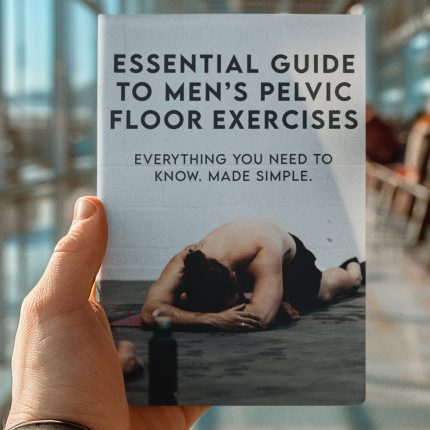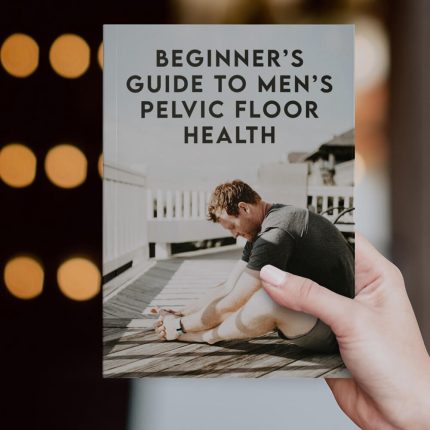
Pelvic Floor Therapy
Common Pelvic Floor Issues in Men

Buckle up, because we're about to dive into a topic that might not be the first thing you think about when it comes to men’s health, but trust us, it’s a game changer. When it comes to common pelvic floor issues in men, it's not just a “women’s issue” any longer. Men’s pelvic health deserves just as much attention, and by exploring everything from pesky incontinence to chronic pelvic pain and even sexual function, you'll learn how a strong, well-balanced pelvic floor is the unsung hero of overall wellness. Whether you're a Gen-Z guy trying to optimize performance or a millennial looking for tips after a prostate surgery, this guide is your new go-to manual for empowering pelvic floor exercises, pelvic floor therapy, and tips for better pelvic floor health.
Quick Links to Useful Sections
- Understanding the Male Pelvic Floor: Anatomy and Function
- Common Pelvic Floor Issues in Men: What’s Going On Down There?
- 1. Chronic Pelvic Pain Syndrome (CPPS)
- 2. Urinary Incontinence
- 3. Post-Prostatectomy Issues
- 4. Erectile Dysfunction
- 5. Pelvic Tension Myalgia
- Pelvic Floor Exercises for Men: Building a Strong Foundation
- The Basic Kegels
- Advanced Exercises and Variations
- Conventional Therapies: Professional Help for Complex Challenges
- Pelvic Floor Physical Therapy
- Biofeedback Training
- Electrical Stimulation Therapy
- Complementary and Integrative Approaches: Beyond the Gym
- Mind-Body Practices
- Yoga and Pilates
- Herbal and Nutritional Supplements
- Nutrition and Lifestyle: Fueling Your Pelvic Health Journey
- Eat Clean, Stay Lean
- Active Lifestyle Essentials
- Sleep and Stress Management
- Real-Life Transformations: Case Studies in Men’s Pelvic Health
- Case Study 1: Bouncing Back after Prostate Surgery
- Case Study 2: Overcoming Chronic Pelvic Pain
- Case Study 3: Enhancing Performance and Reducing Stress
- Designing Your Personalized Pelvic Health Program
- Step 1: Identify Your Symptoms and Goals
- Step 2: Get a Comprehensive Assessment
- Step 3: Build a Multifaceted Approach
- Step 4: Monitor, Adjust, and Celebrate Progress
- Resources and Community Support: Your Next Steps
- Integrative Pelvic Health FAQs: Your Questions Answered
- Embracing Your Journey to Optimal Pelvic Health
Understanding the Male Pelvic Floor: Anatomy and Function
The male pelvic floor is a complex network of muscles, ligaments, and connective tissues that forms the base of your core, supporting internal organs such as the bladder, bowel, and, in some cases, the prostate. Far from being a mysterious, hidden area, the pelvic floor plays a critical role in regulating urinary and bowel control as well as sexual function. Picture it as the unsung support crew for your most vital functions.
Unlike the stereotypical focus on abdominal muscles or biceps, pelvic floor muscles require special care and targeted training. They actively engage during everyday activities like sitting, standing, and even while you’re just chilling on the couch (yes, even Netflix binges can affect your posture!). Maintaining strength and flexibility in these muscles is essential not only for avoiding embarrassing accidents but also for enjoying a robust sex life and overall wellness.
It might sound like a lot to juggle, but understanding how your pelvic floor works is the first step toward reclaiming control. Whether you’re experiencing issues or you’re just curious about preventive health, knowing your pelvic floor anatomy sets the foundation for smart, effective strategies to keep your body in tip-top shape.
Common Pelvic Floor Issues in Men: What’s Going On Down There?
Let’s get real for a minute: as a man, facing pelvic floor problems can feel awkward or even taboo. But guess what? These issues are more common than you might think. The reality is that pelvic floor dysfunction in men generally falls into a few key categories, each with its own set of challenges.
1. Chronic Pelvic Pain Syndrome (CPPS)
Chronic pelvic pain syndrome is one of the murkier villains in the pelvic health story. Characterized by persistent pain in the pelvic region, CPPS can be accompanied by discomfort during or after ejaculation, lower back pain, or even pain in the lower abdomen. For many men, this condition isn’t just physically draining, it’s emotionally taxing too.
CPPS may stem from muscle tension, nerve irritation, or even stress, and managing it requires more than just popping painkillers. Think of it as a signal that something in your body needs extra attention and care.
2. Urinary Incontinence
Nobody wants to worry about bathroom emergencies, but urinary incontinence is a common complaint among men, particularly those who have undergone prostate surgery. Leaking urine, an unpredictable urge to go, or difficulty controlling your bladder can lead to social anxiety and impact quality of life.
The good news is that targeted pelvic floor exercises can help restore control and reduce these symptoms. With the right balance of strength and relaxation, you can regain confidence and put an end to those awkward moments.
3. Post-Prostatectomy Issues
For men who have had a prostatectomy (surgical removal of the prostate), pelvic floor dysfunction is an all-too-common side effect. Urinary incontinence and erectile dysfunction can often follow this surgery, making recovery a multi-dimensional challenge. Rebuilding the pelvic floor’s strength through physical therapy and specialized exercises is key to regaining control and improving quality of life.
If you've been in this boat, know that you're not alone and that effective treatments are available to help you bounce back.
4. Erectile Dysfunction
While erectile dysfunction (ED) can have various causes, including cardiovascular issues, hormonal imbalances, and stress, pelvic floor dysfunction is increasingly recognized as a contributing factor. The muscles in your pelvic floor directly influence blood flow and nerve signals in the genital area. Inadequate strength or coordination in these muscles can impair the supporting process required for a satisfying erection.
By targeting pelvic floor muscles with the right exercises, men can potentially improve erectile function and overall sexual performance.
5. Pelvic Tension Myalgia
If your pelvic floor muscles are overly tense, you might end up with pelvic tension myalgia. Often caused by stress, anxiety, or sedentary lifestyles, this condition can lead to a constant feeling of muscle tightness and discomfort. The irony? In trying to protect your body, your muscles end up causing you pain.
The key here is learning to relax and properly engage these muscles, a balance of strength and flexibility that might be guided by both conventional therapy and mindfulness practices.
These issues might sound like a lot to manage, but by understanding the roots and manifestations of pelvic floor dysfunction, you're well on your way to taking proactive steps that protect and improve your health.
EXPLORE OUR EXPERT MEN'S PELVIC FLOOR GUIDES WITH HIDDEN TIPS AND TRICKS
👨💻 Men's Pelvic Floor Book Store (Instant Download) 👨💻
Pelvic Floor Exercises for Men: Building a Strong Foundation
It might seem like your pelvic floor is a mysterious, hidden part of your body, but in reality, it’s a dynamic collection of muscles that can be trained, yes, like any other muscle group. Pelvic floor exercises, commonly known as Kegels, are a staple in the rehabilitation toolkit for men dealing with pelvic floor dysfunction.
When done correctly, these exercises not only bolster bladder and bowel control but can also enhance sexual performance and provide relief from chronic pain. You might be thinking, “I already work out my abs and biceps, why do I need to train this part too?” The truth is that a strong pelvic floor supports your entire core, improves posture, and helps mitigate injuries that might otherwise take you down a few notches.
The Basic Kegels
The classic Kegel exercise involves contracting and relaxing the pelvic floor muscles. To identify these muscles, try stopping the flow of urine midstream, those are the target muscles! Once you’ve pinpointed them, you can do these discreetly anywhere. Here’s a quick guide:
- Step 1: Sit comfortably with your feet flat on the ground.
- Step 2: Contract your pelvic floor muscles for 5 seconds.
- Step 3: Relax for 5 seconds.
- Step 4: Aim for 10-15 repetitions for a set, and work up to three sets daily.
Remember, the key isn’t how hard you push, but how correctly you engage the targeted muscles. It might feel a bit awkward at first, like trying to flex an invisible muscle, but soon enough, you’ll incorporate these exercises into your daily routine without even thinking about it.
Advanced Exercises and Variations
Once you get the hang of the basics, there are variations you can explore:
- Reverse Kegels: Instead of contracting, focus on consciously relaxing and lengthening your pelvic floor muscles.
- Core Integration: Combine pelvic floor contractions with core exercises like planks or bridges to enhance overall stability.
- Diverse Positions: Practice Kegels while lying down, sitting, or even standing to ensure muscular control in varying everyday scenarios.
Integrating pelvic floor exercises as part of your comprehensive fitness routine not only fortifies these essential muscles but also improves your overall functional strength.
EXPLORE OUR EXPERT MEN'S PELVIC FLOOR GUIDES WITH HIDDEN TIPS AND TRICKS
👨💻 Men's Pelvic Floor Book Store (Instant Download) 👨💻
Conventional Therapies: Professional Help for Complex Challenges
When self-care and exercises aren’t enough, conventional pelvic floor therapies come into play. These therapies are often facilitated by trained professionals who use a range of techniques to diagnose and treat pelvic floor dysfunction.
Pelvic Floor Physical Therapy
Pelvic floor physical therapy is a specialized field that focuses on the evaluation and treatment of pelvic floor disorders. A physical therapist trained in this area will conduct a comprehensive assessment and then develop a personalized treatment plan that may include manual techniques, biofeedback, and guided exercises.
This hands-on approach is particularly effective for post-surgical recovery, urinary incontinence, and chronic pelvic pain. The therapist’s expertise in manual palpation helps pinpoint areas of tension or weakness that require targeted attention.
Biofeedback Training
Biofeedback is like having a mirror for your muscles, it provides real-time feedback on your pelvic floor’s activity, helping you fine-tune your exercises. With the aid of sensors and visual displays, you can see precisely which muscles are engaged and whether your technique is on point.
This technology not only accelerates your learning process but also ensures that you’re getting the most out of each movement, making your home exercise routine significantly more effective.
Electrical Stimulation Therapy
For those dealing with severe muscle weakness or chronic pain, electrical stimulation therapy can be a game changer. Using low-level electrical currents, this technique encourages muscle contraction and helps rebuild strength. While it may sound high-tech, it’s a safe and effective method endorsed by many pelvic floor specialists.
If you’re experiencing post-prostatectomy complications or a lingering pelvic pain syndrome, these conventional therapies might be just what you need to ease symptoms and revive pelvic function.
Complementary and Integrative Approaches: Beyond the Gym
Sometimes, stepping outside the conventional boundaries can yield surprising benefits. Complementary therapies offer holistic ways to balance your body while targeting pelvic floor issues. For men, these integrative methods can make all the difference, especially when paired with rigorous physical therapies.
Mind-Body Practices
Stress is an insidious factor that can wreak havoc on your pelvic floor muscles. Integrating mindfulness practices, such as meditation and deep breathing, not only relaxes your mind but also encourages proper muscle relaxation. By lowering overall stress levels, you’re indirectly reducing pelvic tension and promoting healing.
Yoga and Pilates
Yoga and Pilates are fantastic for building strength, promoting flexibility, and enhancing body awareness. Specific poses, like the bridge, child's pose, and various core-focused movements, target the pelvic region and help balance muscle strength with relaxation. Not only will you feel more in tune with your body, but you’ll also build a robust foundation for pelvic health.
Herbal and Nutritional Supplements
While not a substitute for physical therapy, a nutrient-rich diet and the occasional herbal supplement can work wonders. Ingredients such as omega-3 fatty acids, turmeric, and magnesium are championed for their anti-inflammatory and muscle-relaxing properties, lending extra support to your pelvic floor recovery.
Combining conventional and complementary methods creates a synergistic effect, like when your favorite playlist perfectly matches your workout vibe, resulting in more effective and holistic healing.
EXPLORE OUR EXPERT MEN'S PELVIC FLOOR GUIDES WITH HIDDEN TIPS AND TRICKS
👨💻 Men's Pelvic Floor Book Store (Instant Download) 👨💻
Nutrition and Lifestyle: Fueling Your Pelvic Health Journey
A well-balanced diet and a healthy lifestyle are central to unlocking optimal pelvic floor health. Food is not just fuel; it’s the foundation on which you build strength and resilience. A nutrient-dense diet, loaded with anti-inflammatory foods and sufficient protein, actively contributes to muscle repair and tissue regeneration.
Eat Clean, Stay Lean
Focus on whole foods that naturally reduce inflammation. Think leafy greens, vibrant fruits, nuts, whole grains, and lean proteins like chicken, fish, tofu, and legumes. Integrate these closely with hydration goals, water keeps your muscles elastic and helps flush toxins away.
Active Lifestyle Essentials
As much as you might love your midnight gaming sessions or binge-watching series, regular physical activity is indispensable. Walking, light jogging, or low-impact exercises such as swimming and cycling help maintain overall muscular and cardiovascular health. This in turn supports the pelvic floor, ensuring consistency and flexibility.
Sleep and Stress Management
Never underestimate the power of a good night’s sleep combined with stress-reduction techniques. Adequate sleep (7-9 hours) is when your body repairs itself, and incorporating mindfulness practices, such as guided meditation or deep breathing exercises, further eases muscle tension and mental fatigue.
Small lifestyle adjustments can collectively set the stage for a more resilient, healthier pelvic floor that stands the test of time.
Real-Life Transformations: Case Studies in Men’s Pelvic Health
You might be wondering, "Can these methods really work for someone like me?" The answer is a resounding yes. Across the board, men from all walks of life have experienced profound improvements by taking charge of their pelvic health using a tailored blend of conventional, complementary, and lifestyle strategies.
Case Study 1: Bouncing Back after Prostate Surgery
Meet Mike, a 58-year-old gentleman who faced the challenge of urinary incontinence following prostate surgery. With determination and guidance from a pelvic floor specialist, Mike incorporated targeted Kegel exercises, biofeedback sessions, and stress-reduction techniques into his daily routine. Over several months, not only did his symptoms abate, but Mike also rediscovered his confidence and regained improved sexual function. His journey reinforced the idea that recovery is a gradual, yet achievable, process when you systematically work on strengthening your pelvic floor.
Case Study 2: Overcoming Chronic Pelvic Pain
Then there’s Alex, a 42-year-old guy who had been dealing with chronic pelvic pain that interfered with his daily life. Diagnosed with chronic pelvic pain syndrome, he found solace in a multidimensional approach: partnering conventional physical therapy with yoga, mindfulness meditation, and a nutrient-rich anti-inflammatory diet. Alex’s pain gradually lessened, empowering him to enjoy daily adventures and a reenergized sex life. His story is a testament to the power of an integrative, persistent approach.
Case Study 3: Enhancing Performance and Reducing Stress
For many younger men juggling high-stress jobs and active lifestyles, the pelvic floor often takes a backseat. Enter Daniel, a 35-year-old entrepreneur who experienced intermittent urinary leakage and decreased sexual stamina. By embracing pelvic floor exercises, adopting a healthier diet, and incorporating mindfulness practices into his daily schedule, Daniel not only resolved his symptoms but also bolstered his overall energy and focus. His transformation underscores that pelvic floor health isn’t just for recovery, it’s a cornerstone of long-term performance and well-being.
Each of these real-life stories highlights unique challenges and tailored strategies, proving that no matter the issue, a well-rounded approach can make all the difference.
Designing Your Personalized Pelvic Health Program
There’s no one-size-fits-all solution when it comes to pelvic floor issues in men. Crafting a personalized plan means considering your specific symptoms, lifestyle, and goals. Here's a step-by-step guide to creating a strategy that’s uniquely yours:
Step 1: Identify Your Symptoms and Goals
Start by taking note of the issues you’re experiencing, whether it’s urinary incontinence, pelvic pain, or challenges with sexual performance. Document your symptoms, their frequency, and their impact on your daily activities. Think about what you want to achieve: more control, less pain, or enhanced sexual function.
Step 2: Get a Comprehensive Assessment
Consult with a pelvic floor specialist who can provide a thorough evaluation. This might include physical examinations, biofeedback assessments, and even imaging studies. Understanding the exact nature of your condition is fundamental to tailoring the right approach.
Step 3: Build a Multifaceted Approach
Combine conventional therapies with complementary approaches:
- Structured Exercise Routine: Incorporate both basic and advanced pelvic floor exercises. Use biofeedback tools to ensure you’re engaging the correct muscles.
- Mind-Body Integration: Embed mindfulness practices, deep breathing, and even yoga into your daily regimen.
- Nutritional Optimization: Adopt an anti-inflammatory diet that supports muscle repair and overall health.
- Professional Guidance: Attend regular sessions with a pelvic floor physical therapist for personalized adjustments.
Step 4: Monitor, Adjust, and Celebrate Progress
Keep a health journal recording exercises, dietary habits, and any changes in symptoms. Regularly check in with your specialist, adjust your routines as needed, and celebrate even the small victories. Remember, progress may be gradual, but each step forward brings you closer to a balanced and resilient pelvic floor.
EXPLORE OUR EXPERT MEN'S PELVIC FLOOR GUIDES WITH HIDDEN TIPS AND TRICKS
👨💻 Men's Pelvic Floor Book Store (Instant Download) 👨💻
Resources and Community Support: Your Next Steps
Taking charge of your pelvic health isn’t a solo journey, it’s about finding the right resources and connecting with a supportive community. Whether you’re looking for online forums, local pelvic floor support groups, or apps that guide you through exercises, plenty of avenues can help you stay motivated and informed.
Consider joining communities on platforms like Reddit, Facebook, or specialized men's health websites where stories, advice, and expert tips are shared. And don’t be shy, engage with professionals through webinars, virtual consultations, and local workshops dedicated to pelvic health.
Along the way, remember that knowledge is power. Educate yourself through reputable sources, and always prioritize professional medical advice as part of your journey. By staying connected with both experts and fellow men facing similar challenges, you build a network that not only supports your healing but elevates your overall well-being.
Integrative Pelvic Health FAQs: Your Questions Answered
Below are some frequently asked questions that delve into common concerns about pelvic floor issues in men, along with answers that blend clinical guidance with real-world advice.
1. What exactly are common pelvic floor issues in men?
Common issues include chronic pelvic pain syndrome, urinary incontinence, post-prostatectomy complications, erectile dysfunction, and pelvic tension myalgia. These conditions are linked to weaknesses or imbalances in the pelvic floor muscles.
2. Why is pelvic floor health important for men?
A strong and properly functioning pelvic floor supports bladder and bowel control, improves sexual performance, and contributes to overall core stability and posture. It’s the foundation for daily comfort and long-term well-being.
3. How can pelvic floor exercises help?
Targeted exercises such as Kegels and their variations help strengthen and relax the pelvic floor muscles, improving symptoms like incontinence and chronic pain as well as enhancing sexual performance.
4. Is it normal to experience pelvic floor issues after prostate surgery?
Yes, many men experience urinary incontinence and sexual dysfunction following prostate surgery. With focused pelvic floor rehabilitation, significant improvement is often achievable.
5. Are there non-surgical treatments available for pelvic floor dysfunction?
Absolutely. Options include pelvic floor physical therapy, biofeedback, electrical stimulation, mindfulness practices, yoga, and nutritional interventions.
6. How can lifestyle changes impact pelvic floor health?
A balanced diet, regular exercise, proper hydration, good sleep, and stress management can all significantly improve pelvic floor strength and overall function.
7. Can emotional stress really affect my pelvic health?
Yes, emotional stress can lead to muscle tension throughout the body, including the pelvic floor. Integrating mindfulness and relaxation techniques can help break this cycle.
8. How soon can I expect improvements from pelvic floor exercises?
Improvement timelines vary but with consistent practice, many men begin noticing benefits within a few weeks. Regular assessments with a health professional can help tailor and adjust your routine for the best results.
9. What role does biofeedback play in pelvic floor therapy?
Biofeedback provides real-time insights into your pelvic floor muscle activity, helping you perfect your technique and achieve better outcomes by ensuring correct muscle engagement.
10. Where can I find additional support or resources for pelvic floor health?
Look for reputable men’s health websites, local health clinics specializing in pelvic floor therapy, dedicated online forums, and mobile apps designed to guide you through targeted exercises.
Embracing Your Journey to Optimal Pelvic Health
Ultimately, addressing common pelvic floor issues in men is about taking charge of your health in a holistic, well-informed way. Whether you’re struggling with chronic pelvic pain, dealing with the aftermath of surgery, or simply striving to optimize your well-being, every step you take toward better pelvic floor health is a win.
Empower yourself with the knowledge, techniques, and community support to transform your fitness and quality of life. From disciplined pelvic floor exercises and professional physical therapy to complementary mind-body practices and nutritional strategies, you have a wealth of tools at your disposal.
Remember, your journey isn’t about perfection, it’s about progress. Embrace each improvement, however small, as evidence that you’re moving in the right direction. With a strong pelvic floor, you're not just enhancing bodily functions; you're boosting your confidence, performance, and overall health.
So why wait? Start integrating these strategies today and turn your pelvic floor from a hidden liability into your secret strength. Your future self will thank you for the commitment, perseverance, and care you nurture now, a journey marked by bold recovery, resilience, and the power to truly thrive.
Here’s to embracing your journey, one Kegel at a time!
Curious About Your Pelvic Floor? Explore our curated collection of insightful articles to learn more and take charge of your health.
- Pelvic Floor Basics
- Pelvic Floor Exercises & Workouts
- Pelvic Floor Kegel Exercises: Techniques & Benefits
- Advanced Pelvic Floor Workouts
- Pre/Post-Natal Pelvic Floor Routines
- Pelvic Floor Exercises for Men
- Pelvic Floor Therapy Techniques
- At-home vs Professional Pelvic Floor Therapy Options
- Diet & Lifestyle for a Healthy Pelvic Floor
- Pelvic Floor Health & Wellness
- Specialized Pelvic Floor Conditions & Treatments
Now back to the main article!

















